One year on: Friends and colleagues remember 'eternally optimistic' Peres
A year after his passing, friends, family and colleagues from around the world reminisced about Shimon Peres in Jaffa Wednesday.
 Shimon Peres takes part in a meeting in Ottawa, May 2012Updated:
Shimon Peres takes part in a meeting in Ottawa, May 2012Updated: